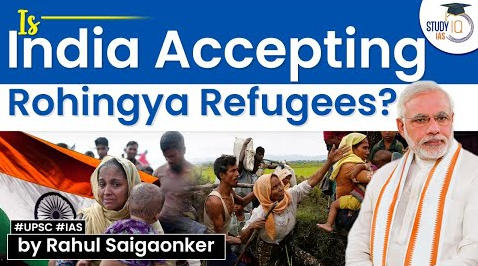Table of Contents

Question
- Addressing the issues of refugees & providing equal rights to them is one of the greatest challenges in front of host nations. In light of the above statement, discuss how India has handled the issue of refugees with special focus on Rohingyas. Do you think, India should bring a comprehensive law for refugees?
The Issue





India & Refugees..!!
- Partition of India
- Tibetan Refugees in 1959
- Bangladesh War 1971
- Sri Lankan Civil War 1980s-2013
- Rohingya Refugees
India & Refugee status
- India is not a signatory to the 1951 Refugee Status Convention.
- India is also not a signatory to the 1967 Refugee Status Protocol.
- 1951 Refugee Status Convention is also called as the Geneva Convention which is a United Nations Multilateral Treaty that defines refugees and the rights of these refugees who are granted asylum and the responsibilities of the nations that grants asylum to them.
- Section 3(2)(c) of the Foreigners Act, 1946 gives the Centre the right to deport a foreign national.
- What is Non-Refoulement?
- The core principle of 1951 refugee convention is non-refoulement, which asserts that a refugee should not be returned to a country where they face serious threats to their life or freedom.
- Non-refoulement is now considered a rule of customary international law.
- India is a signatory to the New York Declaration for Refugees and Migrants, which was adopted in September 2016.


- How can we describe India’s Refugee handling?
- Starting with the Tibetans, Sri Lankans, Afghans, Bhutanese and even people from Myanmar, India has hosted hundreds of thousands of refugees.
- Even though India argues that it has not signed the UN Refugee Convention, there has been a particularly humane approach.
- Is there discrimination towards Rohingya Refugees in India?
- Vivek Katju:
- The fact is that India, like many other countries, has been impacted by international Islamist terror. And therefore, there is greater sensitivity in India, as there is in other countries, when people of a certain faith come to India.
- Meenakshi Ganguly: (Human Rights Watch’s South Asia Director)
- The Rohingya are being treated differently. The entire idea of the Citizenship (Amendment) Act was to discriminate on the basis of religion.
- Rohingyas & India’s diplomatic concerns and bilateral ties with Myanmar
- Vivek Katju
- India has a major security interest in Myanmar and it is not unnatural for a country like India, which shares such a long border, a history of trouble, to look at its security interest first and foremost.
- Within Myanmar, ethnicity is a very sensitive issue, and many communities are discriminated against. It’s not a good thing, or something India would like, but that is part of the xenophobia which the Burman community within Myanmar has traditionally shown. It isn’t easy for the Indian government to deal with the Myanmar military.
- Vivek Katju
- Do we need a new comprehensive national refugee/asylum policy?
- Vivek Katju
- I don’t think India will ever sign these instruments (Refugee convention) because of the nature of their origin, and the fact that they are discriminatory.
- Do we need a refugee law? I think the politics within India today makes it very difficult to have such a law.
- Vivek Katju
- Vivek Katju:






















 WhatsApp
WhatsApp